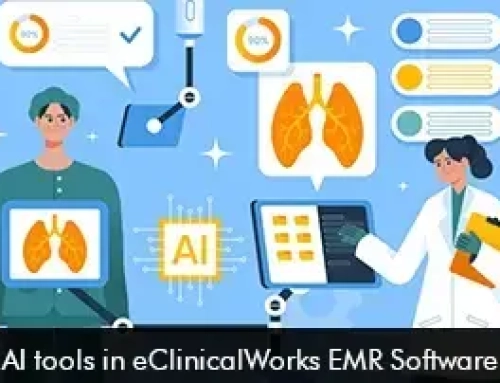Mobile health technology is booming rapidly in the healthcare sector. Making healthcare more efficient, and improved for patients. The technology leverages smartphones and other wireless tools to bring medical care forward. A recent survey revealed that 83% of physicians in the United States use mHealth to provide care to their patients. Mobile health can be used for treatment support, chronic disease management, and disease surveillance.
Mobile health technology uses
Healthcare providers use mHealth technology for the following purposes,
- Immediate access to clinical information to support care decisions. Through mobile-enabled EHR Software solutions and health apps on smartphones.
- Mobile health technology offers a secure 2-way text messaging platform to support seamless collaboration with the care team.
- To effectively communicate with patients through the patient portal platform.
- Offer remote healthcare facilities such as Telemedicine EMR Software.
- Real-time patient monitoring can be done, ultimately enhancing health outcome levels.
How can patients use mHealth technology?
Consumers are increasingly using mobile health because of its convenience and the many benefits it offers to them. Patients can use mHealth technology in the following ways.
- Effectively track their health data such as heart rate etc. through mHealth apps, fitness trackers, and smartwatches.
- Access clinical records via mobile-enabled patient portals and stay connected with their health.
- Communicate with doctors on a HIPAA-compliant messaging facility.
- Chronic disease management.
- Symptom checker.
The importance of mHealth technology in rural areas
Mobile health technology has been a crucial tool to improve health for patients in underdeveloped nations. Through mHealth technology, the government can extend its reach into rural areas so high-quality care can be offered remotely. Lifting barriers to care can enhance health outcome levels in rural areas.
Future of mobile health
The future of mobile health seems promising. As mHealth technology has numerous benefits for patients and healthcare providers. The positive future of mobile health is influenced by the increased use of cloud computing and the internet of things (IoT). Furthermore, the COVID-19 pandemic demonstrated the importance of mobile health solutions, particularly telehealth, to offer continued and prompt remote patient care.
Healthcare clinics with successfully integrated mobile health tech programs
A telemedicine program was implemented by Mayo Clinic in 2007 known as telestroke. The program’s main aim was to treat patients with strokes. The program was initiated as a clinical trial on Mayo Clinic’s Arizona Campus.
Today, the telestroke providers in Arizona, Florida, and Minnesota campuses treat more than 1,500 patients yearly at 27 remote hospital sites. Mobile health technology has the power to improve healthcare delivery and keep patients much more aware of their daily health.








